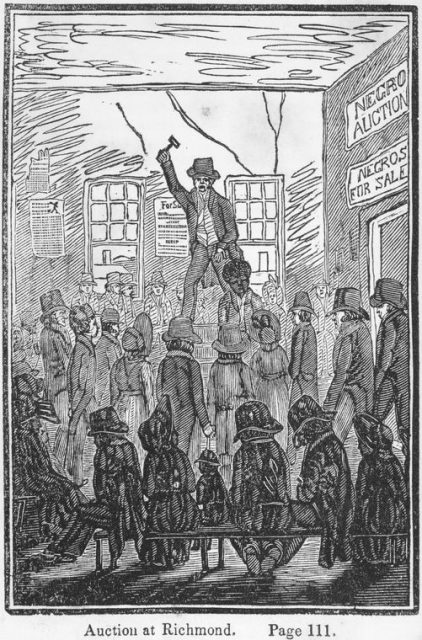In Quillette, Matthew Lesh explains why glib claims that slavery was somehow “essential” to early capitalism or that slavery was the cause of western wealth just don’t hold up to any historical scrutiny:

Auction at Richmond. (1834)
“Five hundred thousand strokes for freedom; a series of anti-slavery tracts, of which half a million are now first issued by the friends of the Negro” by Wilson Armistead and “Picture of slavery in the United States of America” by George Bourne.
New York Public Library via Wikimedia Commons.
It has become a common trope that slavery and the slave trade is responsible for the industrial revolution, if not our entire modern prosperity. Slavery is often called capitalism’s “dark side.” A recent column in the Guardian claimed the slave trade “heralded the age of capitalism” and Guardian columnist George Monbiot said on Twitter: “The more we discover about our own history, the less the ‘trade’ on which Britain built its wealth looks like exchange, and the more it looks like looting. It meant extracting stolen resources and the products of slavery, debt bondage and land theft from other nations.” The same line has been taken by London Mayor Sadiq Khan, who tweeted: “It’s a sad truth that much of our wealth was derived from the slave trade.”
But what did the “father of modern economics,” Adam Smith, actually think about slavery? And is it responsible for our modern prosperity?
Adam Smith argued not only that slavery was morally reprehensible, but that it causes economic self-harm. He provided economic and moral ammunition for the abolitionist movement that came to fruition after his death in 1790. Smith was pessimistic about the potential for full abolition, but he was on the side of the angels.
Smith’s The Wealth of Nations, published in 1776, contains perhaps the best known economic critique of slavery. Smith argued that free individuals work harder and invest in the improvement of land, motivated by their interest in earning a higher income, than slaves. Smith refers to ancient Italy, where the cultivation of corn degraded under slavery. The cost of slavery is “in the end the dearest of any,” Smith writes.
His thinking about slavery can be traced further back. In the Lectures on Justice, Police, Revenue and Arms, delivered in 1763 long before Britain’s abolitionist movement was formalised, Smith writes:
Slaves cultivate only for themselves; the surplus goes to the master, and therefore they are careless about cultivating the ground to the best advantage. A free man keeps as his own whatever is above his rent, and therefore has a motive to industry.
Smith describes how serfs in Western Europe — in feudal relationships with lords — were progressively transformed into free tenants as they acquired cattle and tools. Harvests were more evenly divided between landlord and tenant to encourage better use of land, and tenants eventually progressed to simply giving the landlord a sum for lease. As government became more established, the influence of lords over the lives of tenants was also loosened.
Capitalism was, as Marx described, the next stage in human development after feudal slave relations. Smith’s commercial society is in direct opposition to a slave society. Smith, at his core, is an advocate for individuals being free to specialize and trade, including to trade their labor. Everyone acting with regard to their “own interest,” not because of coercion, creates general prosperity.
Smith’s case against slavery is proven by history: The huge uptick in human prosperity came largely after the end of feudal relations and the abolition of slavery and the slave trade. We are many magnitudes richer than when lords held slaves, or even chattel slavery proliferated in the Americas. The setting free of humanity led to extraordinary innovation and entrepreneurialism. This is only possible, as Smith argued, when individuals can benefit from the fruits of their own labor (slaves cannot hold property in their own name, and hence cannot trade or choose to specialise).
We didn’t become rich because a few hundred years ago people toiled on farms in awful conditions. In fact, the opposite. “It was precisely the replacement of human muscle power with that of steam and machines which did away with the vileness of chattel slavery and forced labor,” Tim Worstall has explained.



